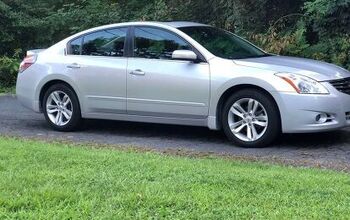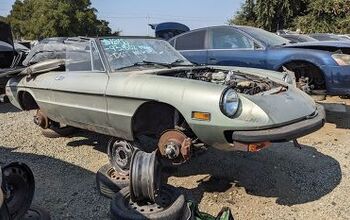Will Chevy's Cruze Diesel Be A "Game Changer"? Lutz Thinks Not
It’s a phenomenon with some precedent: import manufacturers will get nowhere with a certain bodystyle or drivetrain until one of the US domestic brands jumps on the bandwagon and popularizes it. And Jeff Breneman, executive director of the U.S. Coalition for Advanced Diesel Cars, is hoping the same dynamic plays out in the world of diesel power when Chevy brings its Cruze Diesel to the US. He tells WardsAuto
The fact that Chevy will offer a diesel Cruze in 2013 is huge. The gas-powered Cruze will get 40 mpg (5.9 L/100 km), so the diesel is expected to get 50 mpg-plus (4.7 L/100 km), and that will make it a game-changer.
Ford, Toyota or Honda haven’t got a diesel for the U.S. yet, but get ready for 2013-2014. That’s when we’re going to see a lot more diesels.
And, as the diesel booster-in-chief, it’s not surprising that Breneman would come to that conclusion. But what are folks inside GM saying about the Cruze diesel? In a recent interview with TTAC, senior advisor Bob Lutz suggested that we shouldn’t expect the Cruze diesel to conquer America or “change the game” all that much.
Our conversation had turned to emissions regulation, and Lutz had just mentioned that Europeans “cheerfully” pay the equivalent of nearly $40k for a Cruze LTZ with a diesel engine. Since he brought up the Cruze diesel, I asked if he had any insight into the decision to bring it to the US. He answered.
Yeah, it’s almost impossible. We’ll do some because we’ve got them in Europe anyway, and we’ll make them compliant and GM will sell a few just to show that we’re part of the game. But I don’t think anyone sees much of a future for diesels in the states because our emissions regulations are six times tougher than Euro 5, and multiple times tougher than Euro 6, which nobody even knows how to do yet. The companies that are selling diesels in the United States, last time I checked which was over a year ago, are all operating on EPA deviations. So nobody meets even current diesel emissions standards. The EPA renews the deviations on an annual basis, but they’re not supposed to renew for more than three years.
It’s just so tough. You need the urea tank and everything, and in order to do the post-combustion NoX reduction in the catalyst, you have to deviate fuel to the catalyst because every two minutes a burn takes place to fry all the oxides of nitrogen and particulates. Well, that reduces the diesel advantage. So now you’re talking $2,500 of hardware and a big urea tank, and instead of a 30% gain in fuel economy, you’re looking more like 18% or 20% and you’re using a fuel that costs 18-20% more per gallon than gasoline. You tell me how this makes sense.
I mean, it’s cool. Owners of Volkswagon diesels love to go around saying [affects a voice dripping with self-satisfaction] “I have a turbodiesel,” and everyone says “wow.” But Ford canceled their passenger car diesel program, they canceled their midsized SUV diesel program, we canceled ours, we canceled passenger car diesels for the US. We were at one point talking to Honda to see if we could collaborate jointly on, say, a two-liter diesel for passenger cars, and we both came to the conclusion that it wasn’t worth the trip. They were hopeful (and frankly so were we) that with all they know about engine and emissions that they would be able to somehow conquer this emissions conundrum… they gave up. So all the major producers gave up on diesels for the US.
Now, I don’t understand US and EU emissions regulations well enough to fact-check some of Lutz’s technical claims, but his deep pessimism can best be captured by his modest ambitions for the Cruze diesel. Lutz rarely misses an opportunity to praise a GM product, so his “we’ll sell a few just to show that we’re part of the game” line seems quite revealing. Unless things change fundamentally between now and its launch, I wouldn’t expect the Cruze diesel to blow the lid off the diesel market in the US.
More by Edward Niedermeyer
Latest Car Reviews
Read moreLatest Product Reviews
Read moreRecent Comments
- Formula m How many Hyundai and Kia’s do not have the original engine block it left the factory with 10yrs prior?
- 1995 SC I will say that year 29 has been a little spendy on my car (Motor Mounts, Injectors and a Supercharger Service since it had to come off for the injectors, ABS Pump and the tool to cycle the valves to bleed the system, Front Calipers, rear pinion seal, transmission service with a new pan that has a drain, a gaggle of capacitors to fix the ride control module and a replacement amplifier for the stereo. Still needs an exhaust manifold gasket. The front end got serviced in year 28. On the plus side blank cassettes are increasingly easy to find so I have a solid collection of 90 minute playlists.
- MaintenanceCosts My own experiences with, well, maintenance costs:Chevy Bolt, ownership from new to 4.5 years, ~$400*Toyota Highlander Hybrid, ownership from 3.5 to 8 years, ~$2400BMW 335i Convertible, ownership from 11.5 to 13 years, ~$1200Acura Legend, ownership from 20 to 29 years, ~$11,500***Includes a new 12V battery and a set of wiper blades. In fairness, bigger bills for coolant and tire replacement are coming in year 5.**Includes replacement of all rubber parts, rebuild of entire suspension and steering system, and conversion of car to OEM 16" wheel set, among other things
- Jeff Tesla should not be allowed to call its system Full Self-Driving. Very dangerous and misleading.
- Slavuta America, the evil totalitarian police state

































Comments
Join the conversation
Aren't you (the US) long done with the "diesel stigma"? How many people actually remember the brief effort by a single manufacturer to make diesel engines in a handful of models out of gas engines that, to the surprise of nobody who had half a clue, turned out to be utter garbage? Compare that to the number of people paying premiums for older VW and Merc diesels because they're not only as efficient as new ones, they (and the cars around them) aren't half as horrid to own and work on? Or to the number of 4BT/6BT enthusiasts? Bob mentions, but fails to expound on the real reason new diesels are so problematic in the US, and it has nothing to do with diesel technology itself: emissions regulations, and at least as significantly, the utterly asinine policy of US oil companies and taxation schemes that keep diesel priced above gasoline, when its actual production costs are well below. I drove a rental Ford Focus CRDI (not sure what year, but 09 at the oldest) in Turkey recently. Yes, it sounds like a tractor at lower revs. Underway, it's no worse than a comparable gasser. It didn't smell, it didn't smoke, it never once needed its glowplugs despite near-freezing temperatures. I had it up to 190kph and it wasn't done. It had no trouble doing 130k uphill with three people, while using well under 7l/100 (34mpg). About 5.5 (43mpg) at 120k, under 4 (58mpg) while tootling at 70k, all with people and cargo, standard tire inflation, rough Turkish roads. While the car around it is a poorly built econobox with good shocks, I invite anyone with the opportunity to drive one to do so, and just try to not get a sneaking suspicion that there are a lot of cases of head-in-wrong-orifice among the people responsible for deciding what cars get brought to the US.
The Cruze diesel in the USA is going to get 50MPG hwy? I doubt that, at least won't be labeled as such by the EPA. The VW Passat TDI is 43MPG hwy, with the EPA test cycle. Does GM have some secret diesel technology out there that VW isn't doing? What's the point when the Cruze Eco gas car is 42MPG hwy EPA rated? Diesels do have the advantage of being a lot more efficient at idle, so cops should use a V6 diesel instead of gas engine. And lots of torque.